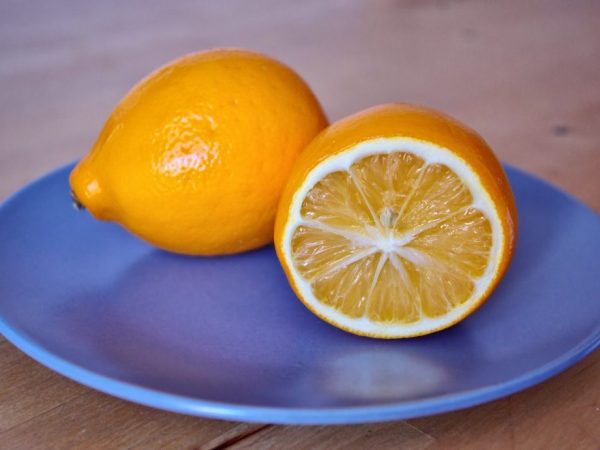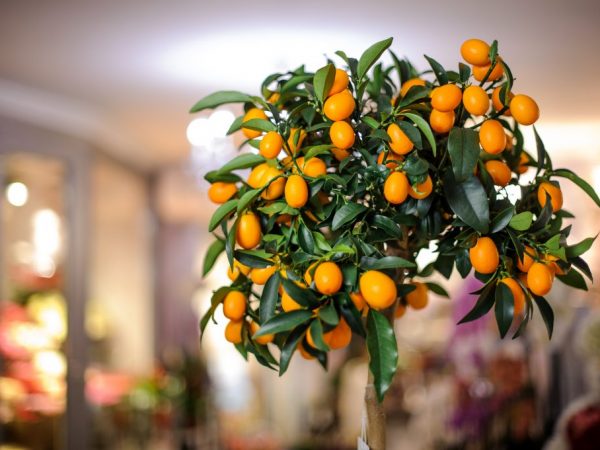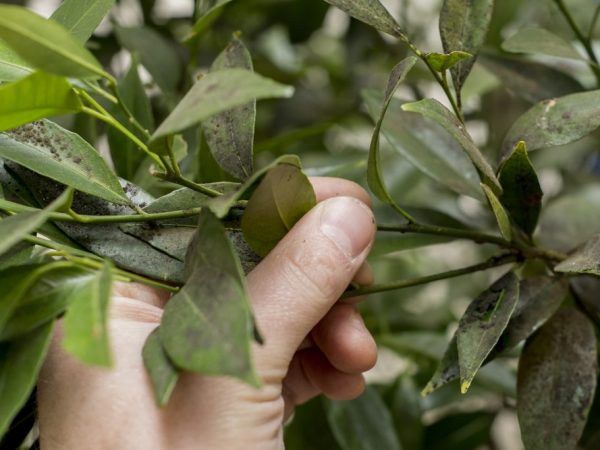Growing Tashkent lemon
Lemons are cultivated for fruit, as well as for decorative purposes. Its juice, skin and zest are used in cooking and for the preparation of medicines. The fruit does not require special care and tolerates room conditions normally. Tashkent lemon is a popular homemade variety.

Growing Tashkent lemon
Lemon characteristic
The bushes of Tashkent lemon, according to the description, resemble a small tree. The crown is thick. A feature of the variety is unpretentiousness to climatic conditions, as well as high resistance to diseases.
In the fruiting season, it develops quickly, has a high yield. The Tashkent lemon is characterized by a large number of fruits. In order for the branches to withstand, ripe fruits are harvested on time.
Description of the bush
Tashkent lemon is a tree-like undersized plant with a dense crown. In outdoor conditions it reaches 2.5 m in height, and when grown at home - less than 1 m. Young shoots are bright green in color. Stem branches and bark are pale olive.
Leaves are medium-sized, oval-shaped, with a sharp end, have a deep green color, with small jagged edges. The size of one is 9-10 cm.
The crown of Tashkent lemon does not need pruning. The tree branches on its own and forms a neat shape. The branches are located at right angles to the trunk, have a curved shape and are covered with a small number of sharp thorns.
The plant has a large number of small self-pollinated flowers. According to the description, the flowers are pinkish rather than white. Flowering occurs in spring and autumn.
Description of fruits
According to the description, the fruit of the Tashkent lemon is more reminiscent of Meyer's berries. Their distinguishing feature is their small size and egg-like shape. The weight of one fruit does not exceed 120 g.
In terms of aroma, the fruits do not resemble lemon, but a mixture of the smell of tangerine and pine needles. The peel has a bright orange color, buttery, looks like an orange.
The skin is thin. Inside is a juicy pulp of orange light. The taste is pleasant, sweet, without strong sourness. The variety bears fruit 6 months after the start of knitting.
Growing lemon
Tashkent lemon is popular for home cultivation due to its resistance to temperature extremes. A room with humid air and a moderate amount of sun is suitable for the variety.

The variety tolerates temperature extremes well
Maintenance makes it easy to avoid the need for pruning. The plant lives for a long time and bears fruit regularly.
Landing in the soil
Saplings thrive in low acidity soil. The presence of minerals and nutrients in the soil accelerates growth and increases yields. The soil should be loose and fluffy so that the roots receive the required amount of oxygen and moisture.
Suitable for planting:
- ready-made soil for citrus fruits;
- flower mix;
- soil with organic fertilizers;
- deciduous and woody land;
- soil with the addition of wood ash.
Capacity is also important. It is better to take the pot from clay. This will prevent waterlogging from causing disease.
When using seeds, the healthiest, with a holistic structure are selected. The material is placed in the soil to a depth of 1 cm and the container is covered with foil until young stems appear. When the plant reaches 20 cm in height, it is transplanted into a larger container.
Plant care
Lighting is one of the most important factors in citrus fruit care at home. Plants are best grown on a west-facing windowsill. This will provide the optimal amount of sunlight.
It is impossible to drastically change the location of the plant: this will cause the loss of leaves and fruits, as well as the termination of flowering. Periodically, the citrus pot is turned 1.5-3 cm for even crown development. It is forbidden to touch the tree during flowering.
Uzbek lemon feels perfect at a temperature of 18-20 ° C. In summer, it is better to take the plant out to the balcony, if there is not too much sunlight there.
Fertilizers
Tashkent lemon is fertilized with a number of substances:
- humus;
- ash;
- fertilizers containing potassium;
- ammonium nitrate;
- superphosphates;
- mineral fertilizers.
The first years do not add top dressing, there is enough of the one that was originally contained in the soil. Complex substances are added for 2-3 years in spring and autumn.
Watering
The Uzbek lemon does not need frequent watering. The soil needs to be irrigated 2-3 times a week. In winter, moisture is introduced 2 times less often. For irrigation, use clean, settled water.
The more important factor is the spraying of the crown. For lemons, moisture in the air around the tree is more important. To do this, the plant is sprayed every 2 days in the hot season. If the plant is near heating sources in winter, the air is also regularly humidified.
Diseases and pests

Onion peels can be used to combat aphids.
The insects that live on citrus trees are:
- shield;
- spider mite;
- aphid;
- white mosquitoes.
Also, the variety is exposed to such viral diseases:
- rotting of bark and branches;
- dying off of roots;
- cracks in the bark;
- yellowing of foliage.
Fight disease
When symptoms of gommosis or root rot appear, the affected plant segments are removed. The wounds are treated with a solution of copper sulfate and the lemon is transplanted into another pot.
Root diseases develop with stagnant water and waterlogging. When symptoms appear, watering is stopped and the damaged processes are cut off. The plant is transplanted into fresh soil and treated with chemical regeneration stimulants.
Pest control
To prevent the appearance of harmful insects, use:
- vinegar solution;
- garlic infusion;
- warm water;
- purchased insecticides.
To get rid of aphids, wipe the leaves with a napkin dipped in warm water. Ash and onion skins also work well.
Prophylaxis
It is possible to ensure good humidity by the presence of a container with clean water next to the pot. Also, alkali should not be allowed to enter the soil: it increases the acidity of the soil.
Cut off dried segments. This allows the tree to develop better. Lemon is not recommended to be grown in the kitchen, since the plant absorbs gas that is destructive for it from the stove.
Conclusion
The cultivation of Tashkent lemon is successful, subject to all standards of care. The tree is regularly examined for pathologies. With yellowness on the leaves, it is moved to the shade.
Lemon propagation is carried out by layering or grafting. Cuttings are also used, cutting off the most productive branches from the tree.


